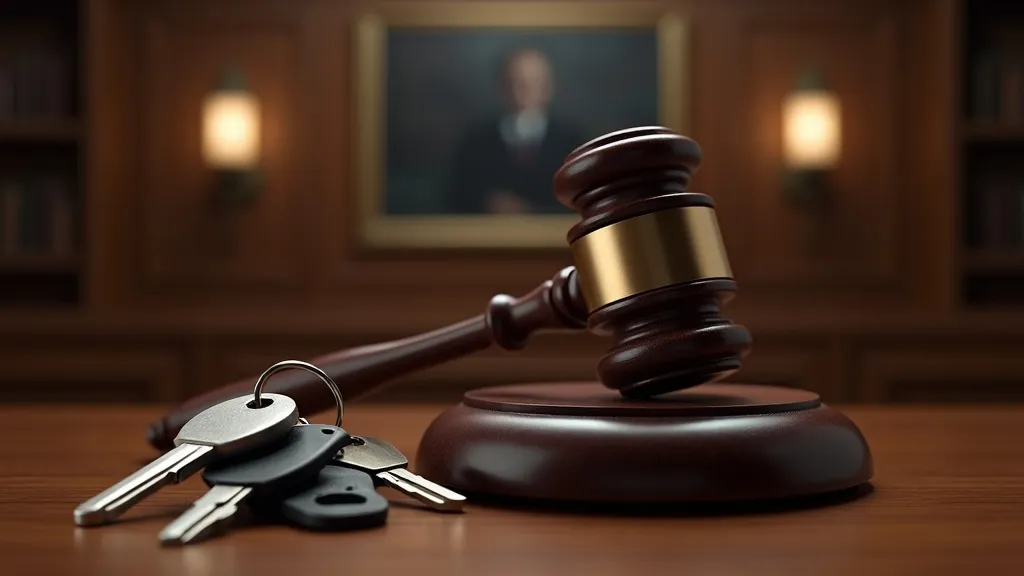Understanding Wrongful Repossession Laws
Wrongful repossession occurs when a lender or repossession agent takes back possession of a borrower's property in violation of the law. This article delves into the legal framework surrounding wrongful repossession, examining causes, consequences, and remedies. By understanding the nuances and legal standards, individuals can better protect their rights and navigate potential disputes effectively.

Understanding the Concept of Wrongful Repossession
Wrongful repossession is a legal violation characterized by a lender or repossession agent unlawfully reclaiming possession of a borrower's property, typically a vehicle. This often occurs due to mistakes in paperwork, failure to follow legal procedures, or miscommunication between the lender and the borrower. Understanding this concept is vital for consumers to protect their rights and ensure that repossessions are conducted lawfully. The ramifications of wrongful repossession can extend beyond losing possession of an item; they can affect credit ratings, personal relationships, and emotional well-being. Therefore, awareness and education surrounding this issue are crucial for all consumers involved in financing agreements.
Legal Framework and Consumer Rights
The legality of repossession is governed by federal and state laws, which stipulate the process that lenders must follow before repossessing a property. The Uniform Commercial Code (UCC) and the Fair Debt Collection Practices Act (FDCPA) are primary federal laws that protect consumers from unlawful repossessions. These laws require lenders to provide proper notice and avoid breaching the peace during the repossession process. In addition to these federal regulations, many states have their own specific repossession laws that may offer even greater protections for consumers. For example, some states may require lenders to obtain a court order before repossession can occur, while others may have specific guidelines on how repossession agents can operate.
Furthermore, consumers have rights under various consumer protection laws. They are entitled to receive notice of default and an opportunity to cure the default before repossession occurs. This means that if a borrower is behind on payments, they should be informed and given a chance to bring their account up to date before any drastic action is taken against them. Consumers also have the right to be treated fairly and without harassment during the repossession process. If a lender or repossession agent acts in a threatening or abusive manner, borrowers may have grounds for legal action.
Causes of Wrongful Repossession
Several factors can lead to wrongful repossession, including:
- Miscommunication: Errors in communication between lenders and borrowers can result in wrongful repossession. For instance, if a borrower has made arrangements to defer payments, but the lender's system is not updated, it may lead to an unlawful repossession. Such situations are often exacerbated by a lack of clear communication channels and inadequate customer service. Borrowers should ensure they document any communications regarding payment arrangements or disputes, as these records may be crucial in the event of a wrongful repossession.
- Paperwork Errors: Mistakes in documentation, such as incorrect loan balances or payment histories, can lead to unjust repossession actions. This could occur if a lender miscalculates a borrower's payments or fails to account for payments that have already been made. In such cases, borrowers must keep meticulous records of their payment histories and any correspondence with their lenders to challenge erroneous claims effectively.
- Failure to Follow Protocol: Lenders must adhere to specific legal protocols before repossessing a property. Skipping steps, such as providing proper notice, can result in a wrongful repossession. Each state has different laws governing the repossession process, and lenders must familiarize themselves with these regulations to avoid legal repercussions.
- Inaccurate Account Status: In today’s digital age, many lenders rely on automated systems to manage accounts. If these systems are not properly updated or maintained, they can lead to inaccurate account statuses. For instance, a borrower may have made a payment that is not reflected in the lender's system, leading to a premature repossession.
Consequences of Wrongful Repossession
The implications of wrongful repossession can be severe for both lenders and borrowers. For consumers, it can lead to stress, financial difficulties, and a damaged credit score. The emotional toll of losing a vehicle or property, especially when it has been wrongfully taken, can lead to anxiety and even depression. Additionally, the practical implications of being without a vehicle can affect a consumer's ability to work, attend school, or manage daily responsibilities, creating a ripple effect in their personal and professional lives.
For lenders, engaging in wrongful repossession can result in legal actions, financial penalties, and reputational damage. Lawsuits can be costly, and negative publicity from wrongful repossession incidents can deter potential customers. Furthermore, lenders may face regulatory scrutiny and increased oversight from consumer protection agencies, which can complicate their operations and lead to further financial losses.
In some instances, consumers may also pursue punitive damages, which can significantly increase the financial burden on lenders. This highlights the importance of adhering to legal standards and maintaining clear communication with borrowers. Establishing a good rapport with customers can help avoid misunderstandings that might lead to wrongful repossession.
Remedies and Legal Recourse
Borrowers who experience wrongful repossession have several remedies available. These include:
- Filing a Complaint: Consumers can file a complaint with the Consumer Financial Protection Bureau (CFPB) or state regulatory agencies. These complaints can lead to investigations that may hold lenders accountable for their actions. It is essential for consumers to provide detailed information and documentation when filing a complaint to increase the chances of a favorable outcome.
- Seeking Legal Action: Borrowers can sue for damages, including compensation for emotional distress, lost wages, and legal fees. If a borrower can prove that their property was wrongfully repossessed, they may also be entitled to the return of the property as well as additional damages for any inconvenience or hardship caused by the repossession. Consumers should consult with an attorney who specializes in consumer protection law to explore their options and build a strong case.
- Negotiation and Settlements: Often, issues can be resolved through negotiation, leading to settlements that rectify the situation without litigation. Many lenders prefer to settle disputes amicably to avoid the costs associated with legal battles. Consumers can benefit from negotiating directly with lenders and may even find that lenders are willing to work out alternative arrangements or payment plans to resolve the issue.
- Reinstatement of Loans: In some cases, borrowers may be able to negotiate for the reinstatement of their loan agreements, allowing them to keep their property while also reestablishing their payment terms. This can be particularly beneficial for borrowers who are experiencing temporary financial difficulties.
Preventive Measures for Consumers
To avoid wrongful repossession, consumers should:
- Keep Accurate Records: Maintain accurate and up-to-date records of all loan payments and communications with lenders. This includes storing receipts, email correspondence, and notes from phone conversations. By keeping detailed records, consumers can protect themselves in case of disputes over payment status or loan terms.
- Communicate Proactively: Inform lenders promptly of any changes in financial circumstances and seek to negotiate payment plans if necessary. Establishing open lines of communication with lenders can prevent misunderstandings and facilitate solutions before they escalate into repossession actions.
- Understand Your Loan Agreement: Familiarize yourself with the terms of your loan agreement, especially clauses related to default and repossession. Knowing your rights and obligations under the agreement can empower consumers to advocate for themselves and avoid pitfalls that could lead to wrongful repossession.
- Request Confirmation: Whenever making a payment or arrangement with a lender, request written confirmation. This can serve as proof in case of discrepancies or misunderstandings in the future.
- Review Credit Reports Regularly: Monitoring your credit report can help identify any discrepancies or issues that may arise from wrongful repossession. Consumers are entitled to one free credit report annually from each of the three major credit bureaus. Regularly reviewing these reports can help catch errors early.
FAQs on Wrongful Repossession
- What should I do if my property is wrongfully repossessed? Contact your lender immediately to resolve any misunderstandings. If the issue persists, consider seeking legal advice. Document all interactions with the lender and any evidence supporting your claim of wrongful repossession.
- Can I get my property back after a wrongful repossession? Yes, if a wrongful repossession is established, you may have the right to reclaim your property and seek damages. The process of reclaiming property can vary based on state laws and the specific circumstances of the case.
- How can I prove wrongful repossession? Gather evidence such as payment receipts, communication records, and any notices received from the lender to support your case. Additionally, witness statements or recordings of conversations can bolster your claim, particularly if there were discussions that contradict the lender's actions.
- What are the possible defenses against wrongful repossession? If a borrower was not in default, had made timely payments, or had a valid agreement with the lender to delay payments, these can serve as strong defenses against wrongful repossession claims. Legal counsel can assist in identifying the most effective defense strategy.
- Are there time limits for filing a wrongful repossession claim? Yes, each state has its own statute of limitations for filing legal claims related to wrongful repossession. It's important to act quickly and consult with an attorney to ensure you meet any deadlines and preserve your rights.
Conclusion
Wrongful repossession can have significant impacts on consumers, making it crucial to understand the legal protections available. By staying informed and proactive, borrowers can better safeguard their rights and navigate the complexities of loan agreements and repossession processes. Awareness of the potential causes and consequences of wrongful repossession empowers consumers to take preventative steps, communicate effectively with lenders, and seek recourse when necessary. Ultimately, a well-informed consumer is better positioned to defend their rights and maintain control over their financial well-being.
Furthermore, it is important for consumers to remember that they are not alone in facing these challenges. Many organizations and legal resources are available to provide assistance and guidance. Whether through legal aid societies, consumer rights organizations, or private attorneys, individuals experiencing wrongful repossession can find support to help them navigate the complexities of the legal system and reclaim their rights. By actively engaging with these resources, consumers can build a stronger foundation for their financial future and reduce the likelihood of experiencing wrongful repossession in the first place.
-
1

Explore Thrilling Adventures: Unveil the World's Very Exciting Travel Destinations
-
2

Unlock the Secrets to Maximize Your Kona SUV's Fuel Economy
-
3

Unlock the Highest Resale Profit: Expert Tips for Boosting Your Kona SUV's Value
-
4

Effortless Adaptation to Senior Apartment Living: Master the Transition with This Ultimate Strategy
-
5

Transform Your Senior Apartment into a Cozy and Charming Retreat: Personalized Touches to Make It Truly Home










